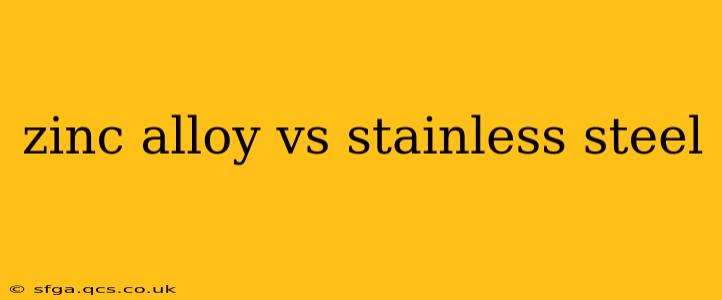Choosing between zinc alloy and stainless steel often hinges on the specific application. Both materials offer unique properties, making them suitable for diverse industries and purposes. This detailed comparison explores their key differences to help you make an informed decision.
What is Zinc Alloy?
Zinc alloys are metal alloys where zinc is the primary component, often combined with elements like aluminum, copper, and magnesium. These additions enhance the alloy's mechanical properties, corrosion resistance, and castability. Zinc alloys are known for their versatility, allowing for intricate designs and complex shapes through various casting processes like die casting.
What is Stainless Steel?
Stainless steel is an iron-based alloy containing a minimum of 10.5% chromium. This chromium content forms a passive layer of chromium oxide that provides exceptional corrosion resistance. The addition of other elements like nickel, molybdenum, and manganese further enhances its properties, resulting in various grades of stainless steel with varying strengths, corrosion resistance, and ductility.
Zinc Alloy vs. Stainless Steel: Key Differences
This table summarizes the key differences between zinc alloys and stainless steel:
| Feature | Zinc Alloy | Stainless Steel |
|---|---|---|
| Cost | Generally less expensive | Generally more expensive |
| Strength | Lower tensile strength | Higher tensile strength |
| Ductility | Moderate | Moderate to High, depending on the grade |
| Corrosion Resistance | Good, especially with surface treatments | Excellent |
| Machinability | Good, easily cast and machined | More difficult to machine |
| Weight | Lighter | Heavier |
| Appearance | Can be easily plated or painted to various finishes | Typically has a metallic, silvery appearance |
| Recyclability | Highly recyclable | Highly recyclable |
Which Material is Stronger: Zinc Alloy or Stainless Steel?
Stainless steel possesses significantly higher tensile strength compared to zinc alloys. This means stainless steel can withstand greater stress before deformation or failure. This strength advantage makes stainless steel ideal for applications requiring high durability and load-bearing capabilities. Zinc alloys, while not as strong, are suitable for applications where high strength isn't a primary concern.
Which Material is More Corrosion Resistant: Zinc Alloy or Stainless Steel?
While zinc alloys exhibit good corrosion resistance, particularly when surface treated, stainless steel offers superior corrosion resistance. The passive chromium oxide layer on stainless steel provides excellent protection against rust and degradation in various environments. However, the specific grade of stainless steel significantly impacts its corrosion resistance.
Is Zinc Alloy or Stainless Steel Better for Die Casting?
Zinc alloys are far better suited for die casting. Their low melting point, high fluidity, and excellent castability allow for intricate designs and high production rates. Stainless steel's high melting point and lower fluidity make it significantly more challenging and expensive to die cast.
Which Material is Better for Outdoor Applications?
For outdoor applications exposed to harsh weather conditions, stainless steel generally provides superior performance due to its excellent corrosion resistance. While zinc alloys can be treated to enhance their weather resistance, stainless steel offers more reliable long-term protection against rust and degradation.
Is Zinc Alloy or Stainless Steel More Eco-Friendly?
Both zinc alloys and stainless steel are highly recyclable, making them relatively environmentally friendly materials. The overall environmental impact depends on factors like the manufacturing process and transportation.
Conclusion
The choice between zinc alloy and stainless steel depends heavily on the specific requirements of the application. Consider factors like cost, strength, corrosion resistance, machinability, and the desired aesthetic. Understanding these key differences allows you to select the optimal material for your project, ensuring both functionality and longevity.
